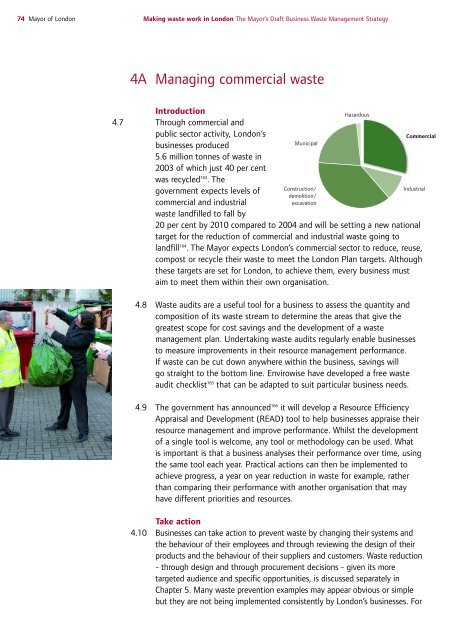Draft Business Waste Strategy PDF - london.gov.uk - Greater ...
Draft Business Waste Strategy PDF - london.gov.uk - Greater ...
Draft Business Waste Strategy PDF - london.gov.uk - Greater ...
Create successful ePaper yourself
Turn your PDF publications into a flip-book with our unique Google optimized e-Paper software.
74 Mayor of London<br />
Making waste work in London The Mayor’s <strong>Draft</strong> <strong>Business</strong> <strong>Waste</strong> Management <strong>Strategy</strong><br />
4A Managing commercial waste<br />
Introduction<br />
4.7 Through commercial and<br />
public sector activity, London’s<br />
businesses produced<br />
5.6 million tonnes of waste in<br />
2003 of which just 40 per cent<br />
was recycled 163 . The<br />
<strong>gov</strong>ernment expects levels of<br />
commercial and industrial<br />
waste landfilled to fall by<br />
Municipal<br />
Construction/<br />
demolition/<br />
excavation<br />
Hazardous<br />
20 per cent by 2010 compared to 2004 and will be setting a new national<br />
target for the reduction of commercial and industrial waste going to<br />
landfill 164 . The Mayor expects London’s commercial sector to reduce, reuse,<br />
compost or recycle their waste to meet the London Plan targets. Although<br />
these targets are set for London, to achieve them, every business must<br />
aim to meet them within their own organisation.<br />
4.8 <strong>Waste</strong> audits are a useful tool for a business to assess the quantity and<br />
composition of its waste stream to determine the areas that give the<br />
greatest scope for cost savings and the development of a waste<br />
management plan. Undertaking waste audits regularly enable businesses<br />
to measure improvements in their resource management performance.<br />
If waste can be cut down anywhere within the business, savings will<br />
go straight to the bottom line. Envirowise have developed a free waste<br />
audit checklist 165 that can be adapted to suit particular business needs.<br />
Commercial<br />
Industrial<br />
4.9 The <strong>gov</strong>ernment has announced 166 it will develop a Resource Efficiency<br />
Appraisal and Development (READ) tool to help businesses appraise their<br />
resource management and improve performance. Whilst the development<br />
of a single tool is welcome, any tool or methodology can be used. What<br />
is important is that a business analyses their performance over time, using<br />
the same tool each year. Practical actions can then be implemented to<br />
achieve progress, a year on year reduction in waste for example, rather<br />
than comparing their performance with another organisation that may<br />
have different priorities and resources.<br />
Take action<br />
4.10 <strong>Business</strong>es can take action to prevent waste by changing their systems and<br />
the behaviour of their employees and through reviewing the design of their<br />
products and the behaviour of their suppliers and customers. <strong>Waste</strong> reduction<br />
- through design and through procurement decisions - given its more<br />
targeted audience and specific opportunities, is discussed separately in<br />
Chapter 5. Many waste prevention examples may appear obvious or simple<br />
but they are not being implemented consistently by London’s businesses. For
















